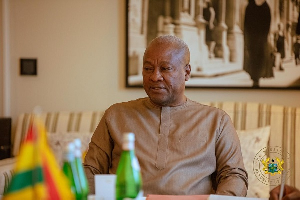..Government Rushes Bill Into Law
The National Chairman of the largest opposition party, the National Democratic Congress (NDC), Dr. Obed Yao Asamoah, has hinted a possible unnecessary provocation and upheaval if the government rushes to pass the People's Representation Amendment Bill into law.
"Let us do more talk in the thinking rather than pushing for it without considering its implications which are likely to create tension and unnecessary provocations in the country. The government should create the atmosphere of slowing down the process.
Nobody is out there just to kick against the government, there are serious issues for considerations," the veteran political counselled.
Urging the government to shelve its determination to allow Ghanaians outside the country to exercise their franchise in haste, the chairman indicated that he does not believe in a referendum if the nation could build a consensus with respect to the amendment. "I am afraid that rushing to amend the bill would create unnecessary provocation in the atmosphere," he cautioned.
Questioning whether all Ghanaian residents outside the country, including those in Togo, Nigeria, Burkina Faso, Ivory Coast and others, would be enfranchised, Obed told The Chronicle in a chat yesterday, said he suspected that the NPP government was jittery about its fortunes.
"They always believe in granting rights to Ghanaians outside to vote but I suspect that they may be jittery, or perhaps, it was out of a conviction they have held for sometime."
The NDC chairman averred that the NDC, as a party, was not opposed to the rights of Ghanaians outside to vote as is now being canvassed across the nation, but maintained that every law in every country has its ramifications.
Responding firmly to speculations that the NDC was against the amendment because the party was scared that those outside the country would vote for the NPP, Dr. Asamoah, also a former Minister of Justice and Attorney General, responded that, that was not the case.
He explained: "it was not that we have taken a blind position on the matter. If we should implement it, we should do it in such a manner or a way that, it would not create a problem in the country. The government should take a bi-partisan approach and discuss the whole issue and see the pros and cons, the difficulties and how we can overcome those difficulties, he suggested. The government was precipitating the whole thing, meanwhile there are serious problems that we need to look at both the theoretical and practical legal level."
According to him, under Article 42 of the Constitution, every Ghanaian has the right to vote but such right under the constitution operates within some geographical limitations, stressing that such a right cannot be exercised outside the country.
Citing an example, Dr. Asamoah, a legal expert, said, in Ghana, the constitution stipulates that every citizen has the right to own property but such a right does not operate outside the country.
"The real issue was that the right to vote does not have any extra-territorial effects. Some rights are enjoyed territorially. We must look at the right to vote in the context of all others. Ghanaian rights were intended to be exercised within the country. The constitution was made for Ghana but was not made for the whole world."
When The Chronicle asked whether, those pushing the bill were myopic or ignorant about the difficulties and legal interpretations, Dr. Asamoah responded in the affirmative.
The issue of Ghanaians living abroad exercising their voting rights under the Constitution, is currently sparking a debate among citizens. As some are advocating for consensus building and looking deep before leaping, government functionaries are pushing for the passage of the Bill as it exists now.
The Parliamentary Select Committee on Legal and Constitutional Affairs, excluding the major opposition party, the NDC, has embarked on public sensitization on the Bill.
Though the public sensitization programme has encountered setbacks, due to some derogatory remarks by some members of the public on opposite sides of the Bill, the majority is alleged to be determined to ensure that the bill is passed.
Prof. John Evans Atta Mills, the 2004 flagbearer of the NDC, another legal heavyweight with a peaceable disposition, has also hinted at anarchy and confusion if the government failed to tread cautiously on the matter.
As things stand now, the suggestion gaining grounds is that the ruling Government will go ahead and ram the law through its overwhelming numbers in Parliament.
General News of Thursday, 21 July 2005
Source: Chronicle
















